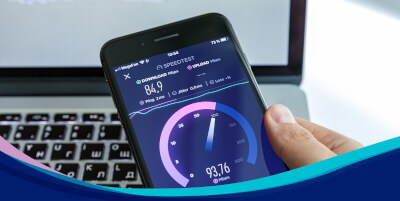Broadband for low income families, social tariffs and benefits
 Dan Howdle • December 13th, 2024
Dan Howdle • December 13th, 2024

For families and individuals on low incomes in the UK, finding the right connection at the right price when finances are limited can be a daunting prospect.
If you or your family are on a tight budget, maybe receiving income support, and/or working anti-social hours, you want a broadband deal that serves your needs and doesn’t cost a fortune. Whatever your situation, our guide will help you get connected at the right price.
Broadband deals for low-income families
With broadband now being considered a basic utility, there are several schemes to help low-income families get online, subject to meeting the eligibility requirements, which is usually being on some kind of social credit.
BT Basic and BT Home Essentials
BT was the first provider to offer low-cost broadband for anyone on benefits. It offers both Home Essentials broadband and the BT Basics phone service to those eligible. BT Home Essentials offers a choice of speeds and types – 36Mbps £15 per month for no income households, and £20 for other, or 67Mbps with unlimited inclusive minutes for £23 per month.
- Income Support
- Income-based Jobseeker’s Allowance
- Pension Credit (Guaranteed Credit)
- Employment and Support Allowance (Income related)
- Universal Credit (and are on zero earnings)
BT Basic costs just £5.10 per month and includes £1.50 of calls. There is a price cap set at £10 so you won’t be charged above that. Alternatively, you can choose BT Essentials Call-only plan which costs a flat £10 per month and includes unlimited minutes to landlines and mobiles in the UK.
Virgin Media Essential Broadband
Virgin Media offers three different packages to customers who are in receipt of Universal Credit. Eligible customers can choose from 15Mbps Essential broadband for £12.50 a month on a rolling monthly contract, or, if you need more speed, 54Mbps for £20 per month. If you would also like a TV service, Virgin offers its essential broadband plus Flex TV, which also costs £20 per month for 54Mbps broadband, and has a £10 upfront cost only for the Flex TV box. None of these Virgin Media packages come with a contract, so you can leave and/or switch whenever you like.
Vodafone Essentials
Vodafone offers eligible customers a 12-month broadband contract with 73Mbps download speeds and no penalty for early cancellation and no mid-contract price rises for £20per month. Anyone in receipt of one or more of the following benefits is eligible:
- Income Support
- Income-based Jobseeker’s Allowance
- Pensions Credit (Guaranteed Credit)
- Employment and Support Allowance (Income related)
- Universal Credit (and are on zero earnings)
- Disability allowance
- Personal independence payments
Sky Basics and NOW Basics
Sky and its sibling company NOW both offer their reduced price Basics broadband for customers on Universal Credit or Pension Credit (although Sky also offers it to those in receipt of Employment Allowance, Jobseekers Allowance or Income Support). The only difference is that Sky only offers this to pre-existing Sky customers, whereas NOW will offer the same discount to new customers.
Both providers offer eligible customers an 18-month contract (with no fees for early termination) with 36Mbps download speed (or 75Mbps if you can get Full Fibre) and pay-as-you-go calls for £20 per month. Note that after 24 months (the contract length) the price reverts to the standard rate.
For more details, see Sky social tariffs
Broadband near you
Cable.co.uk's broadband postcode checker will find you the best deals, providers and speeds where you live. It's free and takes less than a minute to check and compare.
What is the cheapest broadband option?
There are essentially three ways of getting broadband into your home: Standard Fibre, Full Fibre and Cable broadband. The Standard Fibre option (also known as standard broadband) will usually be the cheapest, although is now slowly being phased out due to the widening availability of Full Fibre services.
Happily, the price of Full Fibre broadband has decreased considerably over the past few years and entry-level speeds of around 75Mbps are on a par with Standard Fibre services. If you can afford the extra pound or two, then it’s worth choosing a faster deal as it will more easily cope with a number of devices, including smart phones, TVs and tablets.
How can I make my broadband deal cheaper?
First of all, before you even think of signing a deal with a broadband supplier, always look at what is called the 'total contract cost' – not just the monthly cost or the total first year cost. The total contract cost shows you the minimum you will pay for the length of time you'll sign up for. If that total contract cost isn't quoted, you should ask for it.
The total monthly cost won't include the set-up/installation costs or any additional connection charges. Also remember that the total yearly cost is not the same as the total amount you'll pay if you're tied into an 18-month or 24-month contract.
In many cases, it is making calls on your landline that will cause your monthly broadband cost to increase. Many providers now do not include any free calls – you often have to pay extra even for evening and weekend calls. If you make a lot of calls, it could be worth adding this on, or consider using your inclusive calls on your mobile phone instead and don’t use your landline at all. Most broadband packages sold today now don't come with a phone line – you have to ask for one, so maybe save some money by going without.
All in all, you should make sure you know if, and how much, you are being charged for the following:
- Local call charges – Ideally these should be free
- National calls charges – Ideally these should be free too
- Calls to mobiles – You will be charged for these calls
- International calls – You will be charged for these calls
- Calls to international mobiles – You will be charged a lot for these calls
- 'Other calls not included in your package' – This looks vague because it is. It can cover things like calls to 0845 and 0870 numbers for example
All those costs might look worrying if you're on a low income. Remember that you don't have to use your landline and if you don’t, your monthly broadband cost will stay the same.
Will my credit history stop me getting cheap broadband?
Most broadband providers will carry out a credit check on you before offering a contract. If your credit history (you may also see this written as ‘credit rating’) is poor, you may be rejected. Don’t despair, you can still get broadband at home. There are options for PAYG and also 'no contract' deals available. The no-contract choice usually ties you to a month-long contract which rolls over. Beware though that both PAYG and monthly/no contract deals usually come with hefty set-up costs ranging from £30 to upwards of £50, and can cost more than similar contracted deals.
Some broadband providers do no credit checks at all. Right now those are NOW, Plusnet, and Direct Save Telecom. If you're really worried about your credit score and want a contract deal, you should check what they have to offer.
You can check your credit history and score for free at sites including: Experian, Clearscore, and Equifax.
Can I get broadband for free?
The short answer to this one is: No, you can't get free broadband. There are no free deals in the UK no matter where you look. If you are offered or you see a deal that claims to be free, check the small print – you will end up paying one way or the other.
You may well see adverts for broadband that offer free delivery and installation of your router, zero connection charges, or inclusive calls using the bundled landline phone at certain times of day, but not free broadband itself. You might get one month of broadband free, or even more, but the total price will be averaged out over the contract duration so it is not going to be ‘free’ in the true sense of the word. Always read any terms and conditions, and look at all the details before you actually sign up.
Finally, if any of the details are not clear and obvious to you, remember that you can ask for all charges related to the broadband deal to be explained to you by the supplier. If the supplier can't or won't do this, it's best to look elsewhere.
